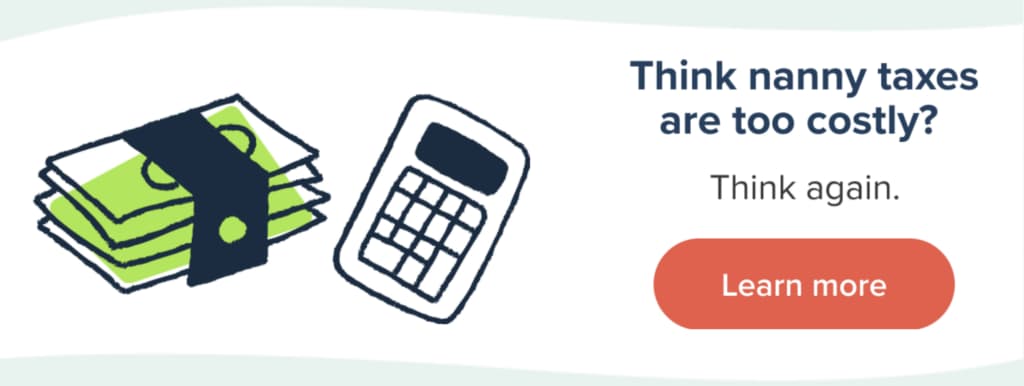Once you’ve made the decision to hire a nanny and decide how much to pay them, the next step is budgeting for household employment taxes. Often called “nanny taxes,” they come into play if you pay a nanny or any other household employee $2,600 or more during the calendar year. Just how much will this cost you, though?
The good news is that with tax breaks, nanny taxes likely will not cost you as much as you expect. For help demystifying what it actually costs to pay your nanny legally — and how you can save money doing so — watch this video and read the corresponding tips below.
How much do nanny taxes cost?
Your total cost will depend on the state you live in, but you should expect to pay about 10% of what your nanny’s gross (before taxes) wages are in household employment taxes. These taxes generally break down as follows:
6.2% in Social Security taxes.
1.45% in Medicare taxes.
Approximately 2.35% in federal and state unemployment insurance taxes. This can vary quite a bit depending on the state you live in.
To see what specific taxes you’ll owe, check out the requirements in your state.
Are there tax breaks I can use to decrease these costs?
Yes. As long as you’re paying your nanny legally, there are two child care-related tax breaks you can take advantage of:
Dependent Care Account
This is a type of flexible spending account (FSA) that is likely available to you or your spouse through your employer. A Dependent Care Account allows you to pay for up to $5,000 of child care-related expenses with pre-tax dollars. That means you would not have to pay any taxes on that portion of your nanny’s wages. Depending on your marginal tax rate, an FSA can save you about $2,000 per year.
To enroll, check with your HR department. Most companies have an open enrollment once a year (usually in the Fall) for the subsequent tax year. However, families can enroll at any time if they have a life-changing event, such as the birth of a child.
Child care tax credit
If your family does not have access to an FSA — or you can’t enroll until the next tax year — you can take advantage of the child care tax credit. Using IRS Form 2441, you can itemize up to $3,000 per child per year (up to $6,000 total). Most families qualify for a 20 percent tax credit, so the net savings is up to $600 if you have one child and up to $1,200 if you have two or more children.
Note: Families with two or more children can use both tax breaks. Use your FSA, with which you can save the most money, for the first $5,000 of childcare expenses and then apply an additional $1,000 toward the child care tax credit to save an additional $200.
To qualify for these tax breaks, your kids must be under age 13 and both you and your spouse must work, be looking for work or be a full-time student.
Is there a way to estimate my nanny tax costs and my tax breaks?
HomePay has a budgeting calculator that will allow you to do exactly that. You just need to input your nanny’s hourly rate, how many hours they’ll work, what state you live in and whether you have access to an FSA. The results will show you the total tax costs for hiring your nanny along with your tax savings. It’s a smart way to set a realistic care budget.
A final cost factor to consider is whether to use a nanny payroll service to manage all of your household employment tasks (preparation, filing and remittance) on your behalf. Care.com HomePay can take this work off your plate and you’re welcome to call for a free consultation and to learn more about how our service works.
Taking care of nanny taxes correctly prevents legal problems for families and ensures that employees receive the benefits and protections they deserve. When you factor in the child care tax breaks, you can see it really is more affordable than most people think.
Your Next Steps:
* The information contained in this article is general in nature, may not be applicable to your specific circumstances, and is not intended to be a substitute for or relied upon as personalized tax or legal advice.

